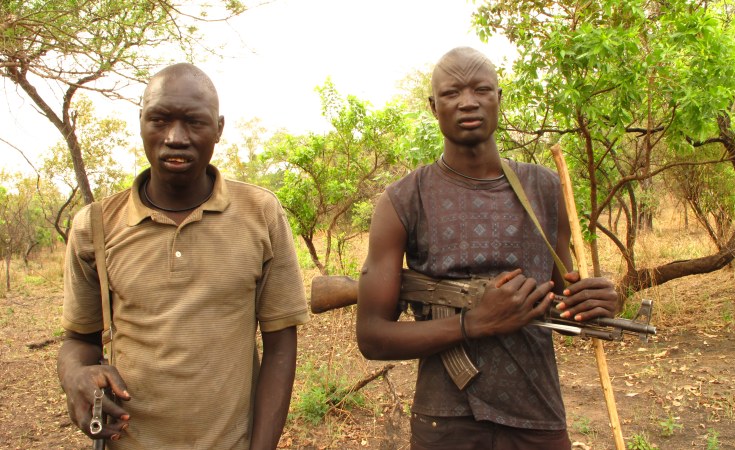Maya Mailer, co-author of new Oxfam report "Rescuing the Peace in Southern Sudan", recently visited the Western Equatoria region to see first hand how rising attacks by the Lord's Resistance Army are destroying lives and livelihoods…
Yambio is one of the most beautiful parts of southern Sudan – the biggest town in Western Equatoria, surrounded by lush green rainforest and fertile farmlands full of banana, mango and papaya trees. But it is also the scene of horrifying atrocities, where the Lord's Resistance Army is terrorising communities, abducting, raping and killing villagers.
Violence has risen dramatically throughout southern Sudan in the past 12 months, forcing over 300,000 people to flee their homes. More than 70,000 of them have been in Equatoria and they have fled the campaign of terror brought on by the LRA, a brutal rebel group with origins in northern Uganda.
A few kilometres from Yambio town, I visited a camp where several hundred people had taken shelter after fleeing one of these attacks. I heard gruesome stories – a mother telling how her son was mutilated and beheaded, a man recounting how his relatives were hacked to death with machetes. For many of the people it was the third or fourth time they had to flee. As they moved, the violence of the LRA followed them. Now they stay in basic shelters, their possessions left behind, gathering dirty water from stagnant pools near the camp and too scared to go home.
I also met with the "Arrow Boys" – a group of men and young boys, many still in their mid teens. They have formed voluntary militias to protect themselves from the LRA. Armed with traditional weapons such as bows and arrows, they patrol the villages at night to try and protect their families and neighbours.
I asked one teenage Arrow Boy whether he still managed to go to school. "We want to get an education," he said, "but if we want to have a future we need to protect ourselves. So we are giving up our future so that we can be protected now."
The LRA's devastating impact on this part of southern Sudan extends far beyond the violent attacks. Community leaders told me that school attendance has dropped significantly in rural areas as children are afraid to walk the long distances. People flee to towns, but the few basic schools there cannot cope with the influx.
Western Equatoria is extremely fertile and many communities are farmers. It should be the greenbelt of southern Sudan, easily able to produce enough food for the region. But fear of attacks has driven many villagers away from their fields. Too scared to farm, this productive area is now suffering food shortages. The traditional trade routes with neighbouring DR Congo have also been cut off, resulting in rising food prices in many local markets.
The delivery of vital humanitarian aid has also been disrupted. Earlier this year, the LRA attacked a distribution of food aid, forcing the UN and international aid agencies to evacuate staff. People who had fled previous attacks in search of help were left hungry.
This region should – and could still – be a real success story. During Sudan's long and bloody civil war – in which 2 million people died – this was one of the most stable areas. When a peace agreement was signed five years ago this week, communities here looked forward to a peaceful and prosperous future rebuilding their country after decades of war. But now villagers tell me that they are even more scared than during the conflict.
Despite the ongoing attacks, the international community continues to neglect the suffering brought on by the LRA. There is a United Nations peacekeeping mission to protect civilians in southern Sudan, but in this corner of Western Equatoria they are barely visible. There are only 150 troops stationed here and LRA attacks have occurred just a few kilometres from their base. Remote and isolated villages are most at risk, but the LRA have this year attacked towns as well.
If southern Sudan is going to emerge successfully from its recent war-torn history then areas such as Western Equatoria must be helped to flourish. Development is urgently needed. Across the region, more than 80% of adults cannot read or write as war disrupted their education. Now the next generation of children in Western Equatoria is facing the same fate.


